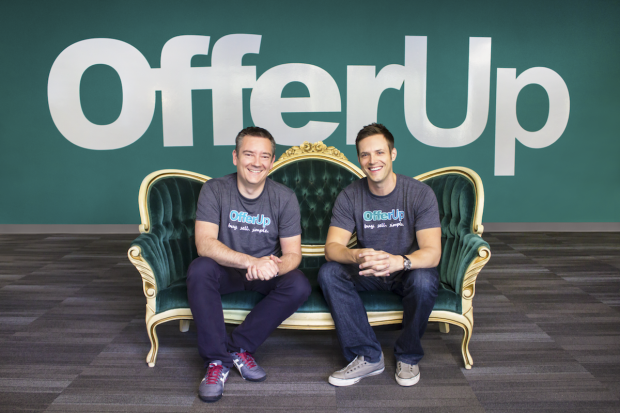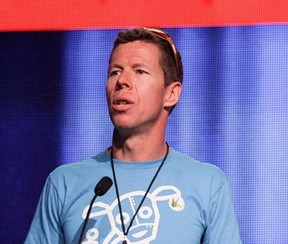Below is a summary of an interview with the prominent Seattle tech investor Chris Devore. Jasper Kuria did the in-person interview and Chris Sheppard contributed to the summary.
Chris DeVore is Managing Director of Techstars Seattle, the Pacific Northwest’s most selective startup accelerator, and also co-founder and Managing Partner of Founders’ Co-op, the region’s leading seed-stage venture capital fund. An active angel investor for over a decade, Chris has invested in dozens of early-stage software companies, including many Techstars graduates.
Previously a co-founder of Adjacency (acquired by Sapient, NASDAQ: SAPE) and Judy’s Book (backed by Mobius VC and Ignition Partners), Chris also created outdoor retailer Patagonia’s online retailing business and led product and business strategy teams at AT&T and McCaw Cellular Communications. As a community volunteer, Chris chairs the City of Seattle’s Economic Development Commission and is also a member of the Policy Leadership Group for the Seattle Metropolitan Chamber of Commerce.
Chris holds a BA from Yale and attended the MBA program at Stanford’s Graduate School of Business.
We usually start all our interviews with the Capital & Growth Good or Evil Rapid Fire Response round i.e. We make a statement pertaining to startups and then the guest has to respond with either “Good” or “Evil” and a short explanation of why. Just “Good” or “Evil” no, ifs or buts or other qualifiers. Find out Chris’s answers (and those of past guests) to the statements below:
- Software Patents
- MBAs at early stage startups
- Women-in-Tech conferences
- The term ‘unicorn’ (a startup with a valuation north of $1 billion)
- Non-compete agreements for early startup employees.
- The single biggest factor that determines a startup’s success [not part of the good or evil but you can compare answers of our various guests]
Main Interview
C&G: You’ve run Founders’ Co-op and Techstar Seattle for a couple of years. What are key lessons you’ve learned?
Chris: Everybody focuses on patents and the tech, yet tech matters less and less. People matter more. For me, finding ways to use technology as a tool to solve problems and finding exceptional people – founders who invent and execute innovation in the face of all kinds of resistance – is paramount. The technology industry is not about bits and bytes as much as it is about human problems and the extraordinary humans who solve them.
C&G: Then why do you insist on having a technical co-founder as part of your admission criteria for TechStars? Could one not just hire the technical skill?
Chris: The people we work with usually have technical backgrounds and software just happens to be the medium of expression. Problems are largely solved through coding, virtual design, and infrastructure. But ultimately, solutions are the point of all of this.
Apple is a good example. In creating their products, they have done everything possible to hide the technology and simply sell a problem/solution paradigm. They keep it elegant and intuitive. Founders of excellent technology understand that it’s not about the product and its features, it’s about solving problems for human beings.
G&G: A hotly debated question in the tech investor community is, “What is the single most important factor for startup success?” Some say it’s the team. Some say it’s the product/market fit. Others say it’s timing. Obviously, all three are important, but if picked one single factor, which would it be?
Chris: I’d say opportunity is the most important. I often meet talented entrepreneurs who put an incredible amount of time and effort into solving problems that ultimately lack real market opportunity.
It’s a waste of their talents. I’d roll back on the team that’s doing something unproductive because it’s an awesome team. I will bet on an exceptional team if they’re doing something productive. By that hierarchy, the opportunity is first, people the second.
C&G: You wrote a blog post about what you thought were bad categories for startup ideas and listed local restaurants, music, and dating. These are bad—you argued–because 1) almost every young founder is pursuing them based on their limited life experience, and 2) the barriers to entry are zero. On the flip side, what are promising startup ideas that not enough people are pursuing?
Chris: We, both in Techstars and Founders’ Co-op, are drawn to founders who have developed deep domain experience in something which is significantly valuable, but not something that the average consumer might encounter.
That may be a business process within the organization they work in or an emerging technology capability (like voice interaction for example). That gets us excited because it smells like the potential for unfair competitive advantage. Unfair competitive advantage is the foundational kind of insight that all investment is based on.
C&G: What are the three things that turn you off when entrepreneurs are pitching to you or applying to your programs?
Chris: I think “turning off” implies that my judgment is right and theirs is wrong. This isn’t necessarily true. As an investor, I only get to make so many investments. For me, those investments need to be “good” investments. It needs to be something that I want to do with my time.
If I have to interact with people that I simply don’t enjoy interacting with – because the interpersonal chemistry is weak – but the idea is still interesting, then I will likely say, “You know, I think it’s interesting, but I am not the right person for your opportunity.”
And that’s highly subjective. It’s important for founders to think of their investors as not just a source of money, but also as partners in the business. Founders should choose investors the same way we choose good friends or life partners. They are going to be with us for a long time. Founders should be as judicious in the selection of their investors’ human characteristics as they are of their resources.
Other things that may turn me off to a potential opportunity are how founders may interact with each other, or if the idea is not adding both social and economic value to the world (not solving real problems or creating value).
C&G: Some investors believe they must be clinically dispassionate about liking people and simply judge an idea on its merits. What do you think about this view?
Chris: I don’t just invest in ideas. I invest in people. So, I need to believe that the people I am investing in are not only extraordinary, but they also must be people that I want to work with. Again, I get to choose what I do for a living, and the choice is to do things that bring me joy and satisfaction.
C&G: What two investments are you most proud of?
The two that best represent the role we want to play in the Pacific Northwest are Remitly and Outreach. Remitly’s CEO, Matt Oppenheimer joined the Seattle Techstars program and I helped them raise their first round of financing. They make it easier, cheaper and safer for immigrants to send money home around the world, making a huge positive impact while also building a big, global, valuable business.
Outreach began with a pair of talented engineers, Gordon Hempton and Wes Hather, who I backed as a team before we even had a clear idea what problem we wanted to solve. They started with a product called GroupTalent in the recruiting space but have since pivoted to marketing automation. Both companies are well on their way to being global leaders and I am incredibly proud to have played a small role in their success.
C&G: What are some mistakes you’ve made as an investor? Feel free to discuss companies you passed on that succeeded – your anti-portfolio if you will.
Chris: There’s so many mistakes. I am a self-taught venture capitalist. I didn’t work at a firm and just learned it along the way. My most fundamental mistakes have involved falling in love with an idea and trying to look past the weaknesses of the founding team. You must have an exceptional, highly functional team of two to four co-founders. When that is absent, falling in love with the idea is the biggest mistake an investor can make.
I have two painful standouts in my anti-portfolio. Number one right now is Twilio [went public in 2016]
I met with Jeff (Twilio’s CEO) when he lived in Seattle and loved him and his idea. But I ran a small fund at the time– just $2.5 million and worried about defending our small interest in that round because I could see how much capital it would take to make the concept work.
The key lesson for me was to always invest in exceptional founders — you can always find the money to make subsequent investments in their companies. Money is more abundant than opportunities. I really kick myself for not having written Jeff a check when I met him. He’s a fantastic entrepreneur and I knew it – I blew it.
The second is OfferUp, Seattle’s only unicorn. But there is a little more nuance to this one.

Nick Huzar, OfferUp’s CEO. Courtesy of GeekWire
Nick Huzar is an amazing founder who applied to our first TechStars class. He was right on the borderline and was not accepted. I ran into him again several times over the years and each time didn’t invest, because of my experience with Judy’s book.
You see, Judy’s Book failed and through that experience I realized just how hard the local merchants space is. Nick eventually pivoted to the idea that’s led to his current success, but I had too much scar tissue from Judy’s Book to invest in anything even remotely similar. Just as it happens sometimes in dating, it was a “it’s not you, it’s me” kind of situation ?
C&G: Who are two investors you admire and why?
Chris: Brad Feld from Foundry Group is easily number one and one of my biggest influences. He was an investor and board member in Judy’s Book, the company that Andy [Sack] and I founded in mid-2000s.
He then co-founded Techstars and is the reason why Andy and I got involved. Not only has he influenced my work, but I am also drawn to him for his tenure in the investment world, his directness and transparency. His just a great human being, through and through!
Fred Wilson would be my other pick. He helped me understand how a venture capitalist thinks about the business.
C&G: You wrote a popular blog post titled “Greedy Bastards” in which you laid out the map for why early stage venture capitalists need to pick projects that have $100 million plus exit potential—this is what you look for when evaluating opportunities. There’s an “Early Exits” movement that is gaining steam. Their crucial insight is that it is easier to be successful [as an investor] by making lots of little investments that target sub $20 million exits. What do you think of this idea?

It is a difficult assumption that an active investor, in a tier-1 market like Seattle or San Francisco, is going to make money on $20 million outcomes. The pre-money valuations that a VC is likely to see is not one or two million dollars apiece. They are four, five, eight, ten and even twelve million dollars apiece. For instance, The Y Combinator class routinely gets double digit pre-money valuations.
So, if an investor thinks she is going to put money to work and generate 3X on average across all her investments–with all the failures involved—you may get there. But she can’t get there with a $20 million exit.
These “Early Exits” people must be fishing in a different pool than I’m fishing in, or maybe they’re better at this than I am. But I honestly don’t see a way to make a seed fund work with $20 million exits, given a failure rate of at least one quarter to a third.
C&G: Do you have any parting thoughts for our readers? If you could give one word of advice to an entrepreneur, what would it be?
Chris: This is a long game – and that applies to both entrepreneurs and investors. My assumption is I’m going to be in business with the people and companies I invest in for a decade. Choose your partners carefully. Choose your opportunities carefully. Choose your investors carefully.
There’s nothing fast about high quality technology innovation. It’s not a quick opportunity. It’s a life choice, and make those life choices as seriously as you would make any other life choice that you’re going to spend the next decade working on.


